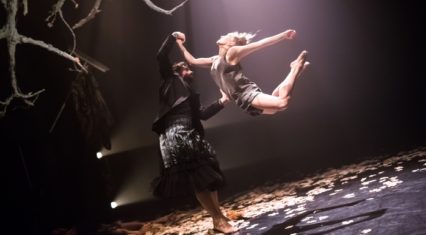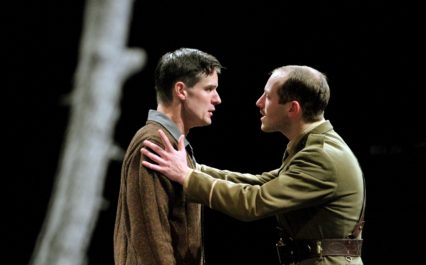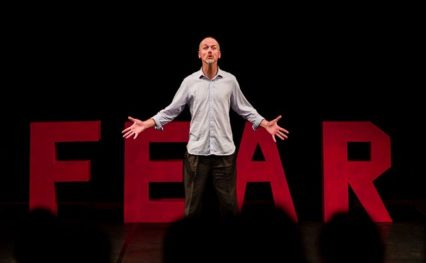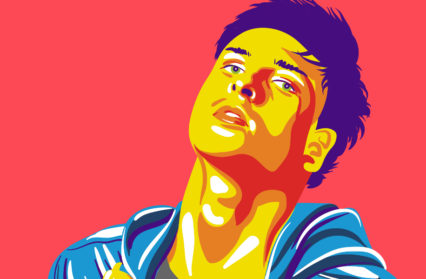Gary Raymond on this year’s Wales in Edinburgh 2017, and what it might mean in the current political climate that the eight shows of the Showcase have made such a positive impact on audiences and critics.
There are few things us bleeding-heart liberals are more terrified of (well, we were up until 2016, at least) than acknowledging the reality of a stereotype. Somehow it feels as if it undermines our noble work, it poisons our soulfood, when we come face-to-face with the fact that such reductionism may have a starting point, no matter how light-hearted. In a recent OffScript Podcast, slam poet superstar Neil Hilborn mentioned that within a few miles of road of his first ever trip to Wales he was surrounded by sheep. Oh no, we all thought – what a shame that was his first impression. There really wasn’t much I could do to deflect the fact the woman next to me on my 6am flight to Edinburgh opened a can of Irn Bru as we lifted into the air.
But Scotland – Edinburgh, at least – seems to have no fears when it comes to its national stereotypes. It is tempting to say that the Scottish own them. What once might have been cartoonish symbols used to mock and subdue a nation, Scotland’s national stereotypes no longer seem to be a point of contention. Perhaps this is because independence from the UK seems only a matter of time, but also because Scotland has a formidable international reputation for “culture”, and no amount of piss-taking from the English is going to dampen that. What the festivals of Edinburgh have contributed to is in giving Scotland a global identity that separates it quite clearly from England.
In contrast, the on-going and often tiring debate about Welsh national identity cannot be untangled from how it sees itself in relation to England, and particularly London.

Scotland has done a far better job of separating itself from London than Wales has. With Cardiff’s regeneration over the last few decades, Wales’ “progress” in terms of politics and business has felt ever more like Scrappy Do to London’s Godzilla. As we constantly try to extricate ourselves from the thing we apparently most do not want to be (English), Wales finds itself unable to be much other than Anglophile. (Ironically, it is in the arts, the sector for which Welsh Government shows least respect, that Welsh identity is most maturely discussed and interpreted).
In terms of economics, media and politics of course, London is a black hole for all other areas of the United Kingdom. And this is perhaps why Edinburgh feels so distinctly European – more so than any other city in the United Kingdom I have spent time in – certainly more European than London. It has that unique geography, the shadows of Arthur’s Seat and Castle Rock, two of its “seven hills”, that give the cityscape something of an Alpine or Pyrenean flavour. Tram cables career above cobbles. Cellar bars, café culture, and a palpable lack of a feeling that England is anything other than just “down there”, a neighbour, something much less than a dominant presence. During this trip, Big Ben fell silent, and I only knew this because the London journalists and Welsh Twitterati I follow on social media had a great deal to say about it. In Edinburgh it was insignificant. It went largely without comment. It takes very little time walking the streets, experiencing the festivals, talking to people, to realise how absurd it is that the paranoiac lies swallowed up by the English and the Welsh will condemn Edinburgh to life deprived of EU membership. It must feel more like being kicked out than pulled out. And as for Scottish Independence, promises just as craven and subsequently discarded as those the Brexiteers gave the whole of the UK during the EU Referendum, ensured a slight victory for unionists in 2014. In this puerile, nonsensical political bubble in which we are living, the results of referenda, it seems, are more important than the integrity of the campaigns that went into them. It is impossible to not feel a profound sense of tragedy at what England, yet again, has done to Scotland.

For Wales the matter of our relationship to England is a much more complex one, but the reason it is so complex is paradoxically simple. Scotland’s idea of identity is one defined by its confidence. Walter Scott and Robert Burns have given them clear cultural markers that have barely wavered in two hundred years. Edinburgh – arguably even more so than London – was the intellectual capital of the Georgian British Empire. And in the Edinburgh Festivals they have a bold cultural brand that brings in people from every corner of the globe. The festivals teach visitors what Scotland is, and crucially what Scottish internationalism means. England, the United Kingdom, appears insignificant to the conversation, even more so in the wake of the Brexit vote. In August, just as Westminster and Cardiff Bay discuss the least harmful way to make the United Kingdom more isolated and puny off the back of a public vote that has no integrity, Edinburgh is a global stage, an all-embracing hotbed of positivity, intellectualism, creativity, ideas, mature debate and the building of relationships. I cannot think of anything more outward looking than Edinburgh in August, and somehow it is that that makes it feel uniquely Scottish.
And this also means that it is Wales that travels to Scotland to showcase the immense talent of its performing arts companies at this year’s Fringe, and not Scotland coming to Wales. You cannot tell me that the maturity of Scottish Nationalism compared to the relative stasis of the Welsh version does not have something to do with 70 Years of the Edinburgh Festival Fringe, an iconic cultural happening that is Scottish to the core.

And yet the question for Wales is not how can we create something akin to the Fringe down here – lord knows Welsh Government only sees art in terms of tourism at the moment anyway, and that mentality is producing such clangers as the Flint Ring. Rather, it is more important right now to use platforms that already exist rather than throwing money at potential failures of our own creation, and it is the Wales in Edinburgh programme that is doing exactly this. Wales’ artists now are given an important spotlight by the joint efforts of the British Council and Wales Arts International (the international wing of Arts Council Wales). The standard on display is extremely high, and it is because of the initial profile-raising of the eight shows included that they have reached the audiences they have. Revlon Girl, for example, which up until the Fringe had received fair-to-middling reviews, is the hottest ticket in town, sold out for the majority of its month-long run at the Assembly Roxy. Neil Docking’s play about the aftermath of the Aberfan disaster has not just found an audience, but in the Fringe bubble has elicited an intensity in its brilliant ensemble cast that it might never have otherwise drawn out. Revlon Girl is receiving daily standing ovations, and it could be argued it is the real individual success story of Wales in Edinburgh, if indeed I was forced to pick one out. It is most certainly not the end of Revlon Girl’s story, and as many have mentioned, it is ripe for screen adaptation.
But all eight shows this year are of a very high quality, and they showcase not just talent, but a diverse range of Welsh companies, from the tiny, DIY-style Fringe show to small independent theatre companies to the national companies. But the Wales in Edinburgh badge brings them together, and gives them a stamp of approval in the town where the five-star-review came to die. As Wales prepares to shrink in the fist of Brexit, it is its artists who keep flying the flag, and with the support of the Arts Council and others, they have flown it with real class on the world stage at this year’s Fringe.
You can read about all of the Wales in Edinburgh 2017 shows and more in our Wales at the Fringe series here.



 Enjoyed this article? Support our writers directly by buying them a coffee and clicking this link.
Enjoyed this article? Support our writers directly by buying them a coffee and clicking this link.







